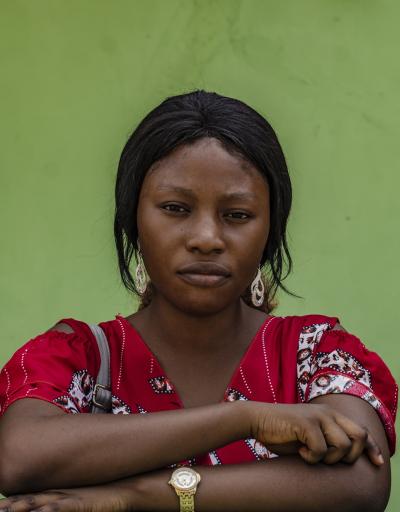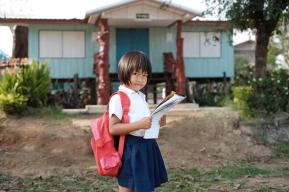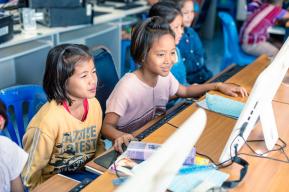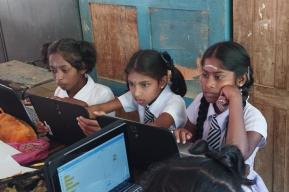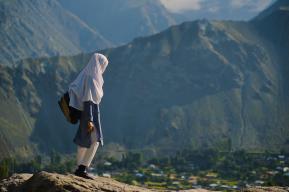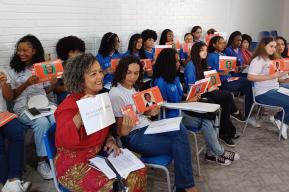In sub-Saharan Africa, the pandemic has deepened pre-existing gender inequalities: girls and young women are the first to leave school, the least likely to learn from home and the last to return to the classroom.
In Nigeria, an overwhelming majority of out-of-school children are girls from rural areas and among the poorest in society, particularly in the north of the country.
With support from Wallonie-Bruxelles International, UNESCO’s Keeping girls in the picture campaign was rolled out as part of a project in four sub-Saharan African countries: Benin, Mali, Nigeria, and Senegal, with a focus on areas where girls’ dropouts are highest and girls’ reenrolment is lowest.
Advocating for girls’ education in Nigeria
The project in Nigeria was crafted around the mobilization of community radios serving rural and remote areas, youth networks and key community leaders, reaching across 820 communities and 24 local government areas. Key to reaching local communities, materials were adapted and translated in four local languages, Hause, Igbo, Yoruba and Pidjin.
In communities, partnerships were secured with religious leaders, community heads and parents and guardians through discussion groups. WhatsApp and Facebook groups brought together teachers, parents, policymakers, youth, religious leaders, parliamentarians and civil society members to discuss girls’ education and advocacy visits were also conducted reaching 10,000 people.
A Girls’ Back to School Advocacy Group and a Woman-to-Woman Talk Initiative were established to engage the support of parents and guardians in favour of girls’ education. In Katsina, individuals indicated interest in setting up a GoFundMe account to support girls’ return to school. The campaign also spurred active debates and discussions taking place in markets and in the workplace.
Meet Gloria, a young advocate standing up for girls’ education
In her fourth year at the University of Ibadan, Gloria Ayodeji, aged 21, grew up in a supportive household with her parents cheering for her growth and success, despite them being non-literate. This has shaped the person that she has become today.
With the Keeping girls in the picture materials in hand, Gloria advocated for girls’ education and reached many girls in her community who would have otherwise dropped out of school after the pandemic. She started an initiative to connect girls interested in skills building to mentors who can guide them.
“Education connects girls with people and activities that build their skills and empower them to lead change”, says Gloria. “With an education, girls know their rights and stand up for what is right.” She sees this advocacy campaign as a call to action to support underserved and out-of-school girls and children.
During the lockdown, Gloria organized an online training to learn design skills for girls who have access to the internet. Offline and after the pandemic, Gloria and her peers continue to support girls who dropped out of school.
Gloria is hopeful: “My wish is to see a world that values gender equality. I want to see more future-forward women emerge in all sectors globally. Young women who are competent, educated and well equipped to lead positive and innovative change.”
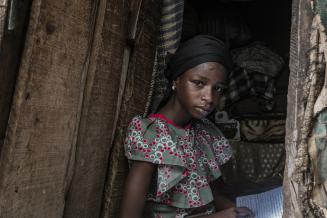
An eye-opener to community members
The local advocacy efforts under this project have felt like an eye-opener to community members, parents and guardians, especially when it comes to the impact COVID-19 can have on a girl’s education and future. It has also provided advocates for girls’ education like Gloria with the tools and backing to continue their work.
In the North Central and North West regions, reports show an estimated 2.5% to 3% increase in girls’ enrolment rates, while in the South West region these are up by 30%. Since the campaign was rolled out in Nigeria, an estimated 8.7 million persons were reached by the project, including nearly 6 million girls and young women. More work is needed to raise awareness in favour of girls’ education, especially in rural communities.
As part of the celebrations for International Day of the Girl, UNESCO is holding a photography exhibition featuring portraits of changemakers in Nigeria, stemming from the Keeping girls in the picture project in Nigeria.
More information
- Read Abireh’s story
- Read about the work in Mali
- Read about the work in Senegal
- Learn more about the Keeping girls in the picture campaign


